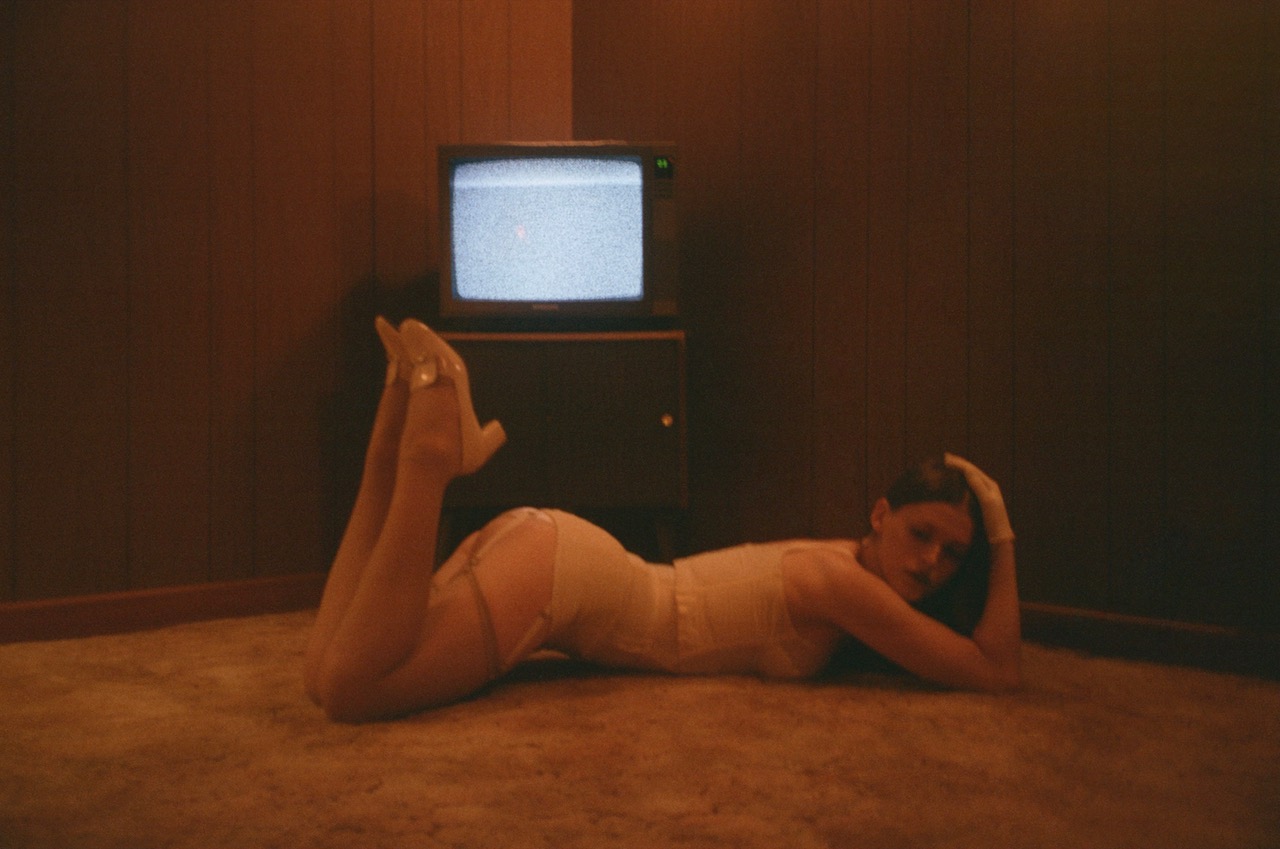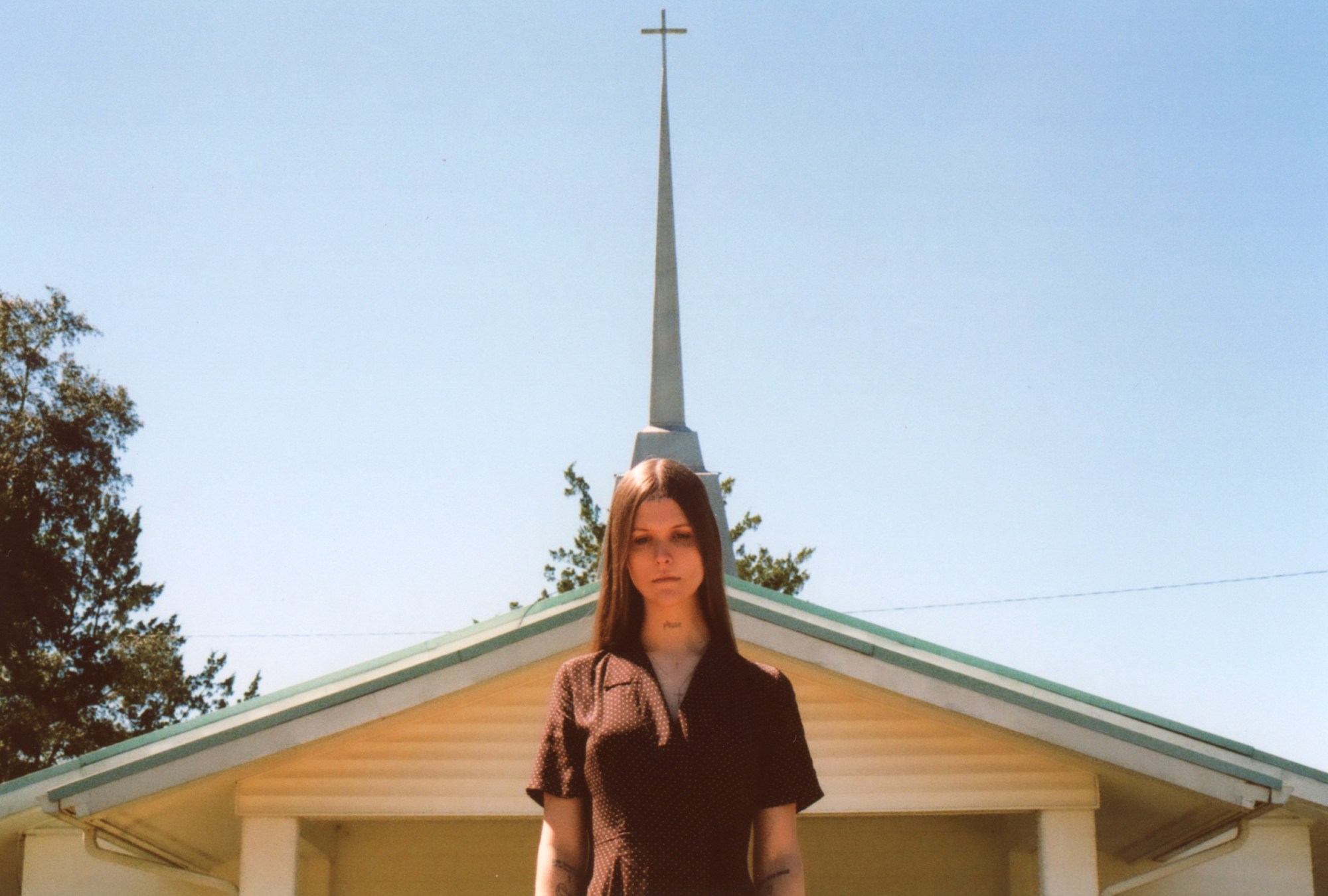Two hard fried eggs, sausage links, and grits. With ice cold water or hot cocoa. That’s Hayden Silas Anhedönia’s classic diner order. “I want 24-hour diners everywhere. Food is so communal for people,” she says with joyful Southern warmth. “I love the idea of having a diner you can go to at any hour.” Her friends back in Tallahassee – where she moved after graduating high school – could be found “at Waffle House at three in the morning” almost every other day. “Because you’re bored at 3AM. I do say that Huddle House is superior to Waffle House. It’s where I would go with my grandpa when I spent the night with him, and we’d get waffles together.”
Between foraging for mushrooms, singing about school shootings, and questioning ideas of trans representation, she’s carved out her own niche in the world of dark, brooding indie rock. She cuts a sharp figure with her tattoos, decorating her long arms and nearly every finger on her hands. On her forehead: Ashmedai, the king of all demons, and Gabriel, the archangel, both in Hebrew. Scrawled across her neck, in handwritten lowercase: the word ‘please’.
Growing up with a Southern Baptist family in the Florida panhandle, subject to televangelism and local church programs, Hayden found inspiration in the repression around her. “I wanted to tell this story that was part horror story, part drama, part romance, part fable, part proverb. The visual inspiration of mid-century farmhouses and wood panelling, country music and gospel music and Gregorian chants and the horror movies that I love.” Ethel Cain is the persona Hayden invented to take on the task of inventing her own Great American Epic. She’s also dead. By the end of Preacher’s Daughter, Ethel Cain has traversed the States from Christian tent revivals and haunted houses in Nebraska to the relative freedom of California, but she can’t escape the abusive relationships of her past, and implicitly falls victim to a kidnapper’s cannibalism.
Despite claiming the contrary on “American Teenager,” 2022 has clearly been Ethel Cain’s year. After a series of stunning EPs and singles like grungy runaway hit “Crush”, she unleashed her titanic debut album, Preacher’s Daughter, in May. Many of the record’s songs hover at around six minutes; tracks like “Televangelism” and “Ptolemaea” end with extended instrumental outros. Songs like “Gibson Girl” and “Strangers” mix pulsing pop energy with hair-metal guitar solos, piano ballads, wild screams, and buzzing flies. Preacher’s Daughter is, in many ways, a peerless record – a triumph. And yet.

Reviewers, for the most part, have noted the pop elements of Preacher’s Daughter and latched onto the dissonance of its more experimental moments. In Pitchfork, Evan Rytlewski likens the artist’s “complicated” relationship with pop to her equally convoluted relationship with God. It’s not “a failed pop record,” she tells me. True, it’s a free-wheeling, sprawling epic that draws on influences from Grouper to Bruce Springsteen to Florence + the Machine. Pop is just part of the equation. “It’s not the pie,” she adds, “it’s just one ingredient.”
Recently, when one writer likened Ethel Cain to Lana Del Rey, two white girls exploring the underbelly of Americana, Hayden tweeted about the unfair comparison. “I love Lana and I love her music but there’s a hundred other things at play here. If that’s an entry way for a review, that’s fine. But sometimes people arrive at Lana Del Rey and stop at Lana Del Rey,” she says, gearing up for the punchline from the original Tweet. “And yeah I called it lazy writing because it’s lazy for me and her. I think it’s kind of a detriment to the expansive work of two female artists to just reduce them to being similar to each other.”
“I was just taking all these things I loved and mashing them into this giant amalgamation of art, and Ethel Cain came out of the cluster. It’s become my vessel for all things creative and it’s been fun playing with it.” So much of the record is focused on the relationships of women to men and what women owe each other in the wake of violence. “Please don’t love how I need you,” she begs on “Western Nights,” as her cult leader persona struggles to keep driving alone past small town diners. “I really wanted to focus on the power that matriarchy holds,” she continues, though she knows that power isn’t an excuse for girlbosses, gatekeepers, and gaslighters. “I never want to slip so far into discussions of trauma where it becomes an absolution for women. The mythos of Ethel Cain is at its core about gender dynamics and womanhood even more than it is about religion.”
Preacher’s Daughter is intended to be the first in a series of records that explore three generations of women. “The story ends with Ethel the daughter, who never becomes a mother. And so it’s another cycle breaking. I find myself asking myself all the time whether or not I have it in me to be a mother. The next record is gonna be heaviest in terms of motherhood themes.”
The anthemic hymnals of Preacher’s Daughter are somewhat reminiscent of Ti West’s 2022 horror film X: both works revel in an obsession with purity, God’s absence, and the swamp. “I’m very picky with the camp that I like,” Hayden says of her love of the film. “I’m obsessed with very painfully serious things that take themselves too seriously, but I honestly loved it. I thought it was so witty. If it’s shot on film and has farmers and old ladies who kill? I’m easily satisfied in that department.” Ethel Cain draws heavily on Hayden’s Southern upbringing, but stays keyed into a unique sensibility: understanding the allure of men who smoke Marlboro Reds and crush beer cans.
“To me, Southern Gothic is stuffy old women in single room schoolhouses, and oak trees,” she adds. It’s “being scared of the swamp and what’s in the closet and what’s under the bed.” A Tumblr kid by origin, Hayden’s appreciation of the aesthetic, in all its iterations, is a comprehensive and profound one. “There’s an aspect to Southern Gothic that’s very bright that I think gets ignored. I love the idea you can be in a white dress with bows in your hair playing hide and seek on the church lawn on a beautiful Sunday morning and there’s not a cloud in the sky and something feels very ominous about that. It is so ripe with possibility for art. I wish we saw more of it.”

Now that she’s on tour, Hayden is leaning into the community that’s built itself around her music. “It feels like I’m part of a choir,” she says. “It’s been like a small family. And this year since the record came out, it’s growing way faster.” On Twitter, a growing number of anonymous trans girls with anime avatars paint Ethel Cain fan art, tweet her lyrics, ensuring old SoundCloud tracks are adequately archived. “I used to pride myself on knowing everyone’s name. Even though I can’t be as personal with everyone as I was in the past, it’s so nice everyone’s tied together with the music. It feels like a family reunion.”
Hayden’s presence on social media is spooky, sexy, and a little chaotic. She’s decorating houses with theremins, playing with swords, and darting in and out of gas stations – it’s certainly not your usual TikTok pop girl fare. “I’m not very good at calculated shit like that. I just started using [TikTok] as a video diary.”
Pre-internet, Hayden might have gone method. “I would’ve loved to do an immersive character where I tried to convince everyone I was literally a psycho cult preacher’s daughter, but the internet exists and no one has any privacy anymore which sucks, but what can you do? You can’t really keep that charade up. I have this serious stick in the mud aesthetic that’s very prim and proper,” she says, laughing. “But also I’m a 24 year old girl being raised in the age of TikTok and I know how to have fun too.”
Preacher’s Daughter is out now.


